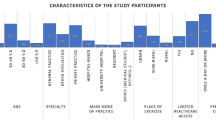ABSTRACT
BACKGROUND
The use of online social networks (OSNs) among physicians and physicians-in-training, the extent of patient–doctor interactions within OSNs, and attitudes among these groups toward use of OSNs is not well described.
OBJECTIVE
To quantify the use of OSNs, patient interactions within OSNs, and attitudes toward OSNs among medical students (MS), resident physicians (RP), and practicing physicians (PP) in the United States.
DESIGN/SETTING
A random, stratified mail survey was sent to 1004 MS, 1004 RP, and 1004 PP between February and May 2010.
MEASUREMENTS
Percentage of respondents reporting OSN use, the nature and frequency of use; percentage of respondents reporting friend requests by patients or patients’ family members, frequency of these requests, and whether or not they were accepted; attitudes toward physician use of OSNs and online patient interactions.
RESULTS
The overall response rate was 16.0% (19.8% MS, 14.3% RP, 14.1% PP). 93.5% of MS, 79.4% of RP, and 41.6% of PP reported usage of OSNs. PP were more likely to report having visited the profile of a patient or patient’s family member (MS 2.3%, RP 3.9%, PP 15.5%), and were more likely to have received friend requests from patients or their family members (MS 1.2%, RP 7.8%, PP 34.5%). A majority did not think it ethically acceptable to interact with patients within OSNs for either social (68.3%) or patient-care (68.0%) reasons. Almost half of respondents (48.7%) were pessimistic about the potential for OSNs to improve patient–doctor communication, and a majority (79%) expressed concerns about maintaining patient confidentiality.
CONCLUSION
Personal OSN use among physicians and physicians-in-training mirrors that of the general population. Patient–doctor interactions take place within OSNs, and are more typically initiated by patients than by physicians or physicians-in-training. A majority of respondents view these online interactions as ethically problematic.


Similar content being viewed by others
References
Lenhart A (2009) Adults and Social Network Websites. http://pewinternet.org/Reports/2009/Adults-and-Social-Network-Websites.aspx?r=1. Accessed May 3, 2011.
Facebook (2010) Press Room-Statistics. http://www.Facebook.com/press/info.php?statistics. Accessed May 3, 2011.
Hitwise (2010) Top 20 sites and engines. http://www.hitwise.com/us/datacenter/main/dashboard-10133.html. Accessed May 3, 2011.
Lenhart A (2009) The Democratization of Online Social Networks: A look at the change in demographics of social network users over time. Pew Internet & American Life Project. http://pewinternet.org/Presentations/2009/41--The-Democratization-of-Online-Social-Networks.aspx. Accessed May 3, 2011.
Hawn C. Take two aspirin and tweet me in the morning: how Twitter, Facebook, and other social media are reshaping health care. Health Aff (Millwood). 2009;28(2):361–368.
Chretien KC, Greysen SR, Chretien JP, Kind T. Online posting of unprofessional content by medical students. JAMA. 2009;302(12):1309–1315.
Lacson SM, Bradley C, Arkfeld DG. Facebook medicine. J Rheumatol. 2009;36(1):211.
Jain SH. Practicing medicine in the age of Facebook. N Engl J Med. 2009;361(7):649–651.
Moubarak G, Guiot A, Benhamou Y, Benhamou A, Hariri S. Facebook activity of residents and fellows and its impact on the doctor-patient relationship. J Med Ethics. 2011;37(2):101–104.
Guseh JS 2nd, Brendel RW, Brendel DH. Medical professionalism in the age of online social networking. J Med Ethics. 2009;35(9):584–586.
American Medical Association (2010) Professionalism in the use of social media. http://www.ama-assn.org/ama/pub/meeting/professionalism-social-media.shtml. Accessed May 3, 2011.
Kellerman SE, Herold J. Physician response to surveys. A review of the literature. Am J Prev Med. 2001;20(1):61–67.
Thompson LA, Dawson K, Ferdig R, Black EW, Boyer J, Coutts J, Black NP. The intersection of online social networking with medical professionalism. J Gen Intern Med. 2008;23(7):954–957.
Fletcher D. Facebook. Time. 2010;175(21):32–38.
Foreman J (2010) You, your doctor, and the internet. Los Angeles Times, April 26, 2010. http://articles.latimes.com/2010/apr/26/health/la-he-Facebook-20100426. Accessed May 3, 2011.
Cohen E (2009) Should you "friend" your doctor on Facebook? http://www.cnn.com/2009/HEALTH/09/03/friending.your.doctor/index.html. Accessed May 3, 2011.
Grover M. Defining the patient-physician relationship in the era of Facebook. Acad Med. 2010;85(8):1262.
MacDonald J, Sohn S, Ellis P. Privacy, professionalism and Facebook: a dilemma for young doctors. Med Educ. 2010;44(8):805–813.
Pew Research Center’s Internet & American Life Project (2010) Online News Survey Dataset. http://pewinternet.org/Shared-Content/Data-Sets/2010/January-2010--Online-News.aspx. Accessed May 3, 2011.
Gorrindo T, Groves JE. Web searching for information about physicians. JAMA. 2008;300(2):213–215.
Greysen SR, Kind T, Chretien KC. Online professionalism and the mirror of social media. J Gen Intern Med. 2010;25(11):1227–1229.
Farnan JM, Paro JA, Higa J, Edelson J, Arora VM. The YouTube generation: implications for medical professionalism. Perspect Biol Med. 2008;51(4):517–524.
Lagu T, Kaufman EJ, Asch DA, Armstrong K. Content of weblogs written by health professionals. J Gen Intern Med. 2008;23(10):1642–1646.
Chretien KC, Azar J, Kind T. Physicians on Twitter. JAMA. 2011;305(6):566–568.
Rosenblum D. What anyone can know - The privacy risks of social networking sites. Ieee Security & Privacy. 2007;5(3):40–49.
Pew Research Center’s Internet & American Life Project (2008) Digital Footprints. http://www.pewinternet.org/Presentations/2008/Digital-Footprints.aspx. Accessed May 3, 2011.
Martin BC. Don’t survey physicians! Chicago: American Medical Association; 1974.
Gorrindo T, Gorrindo PC, Groves JE. Intersection of online social networking with medical professionalism: can medicine police the Facebook boom? J Gen Intern Med. 2008;23(12):2155. author reply 2156.
Acknowledgements
The authors would like to thank the Methodist Health Foundation, the Richard M. Fairbanks Foundation, and the IU Health Values Fund for their support and funding of this study. The authors would also like to thank Mrs. Amy Chamness-Douthit for her tireless work in coordinating the survey responses and data.
Conflicts of Interest
None Disclosed.
Author information
Authors and Affiliations
Corresponding author
Electronic Supplementary Material
Below is the link to the electronic supplementary material.
ESM 1
(PDF 500 kb)
Rights and permissions
About this article
Cite this article
Bosslet, G.T., Torke, A.M., Hickman, S.E. et al. The Patient–Doctor Relationship and Online Social Networks: Results of a National Survey. J GEN INTERN MED 26, 1168–1174 (2011). https://doi.org/10.1007/s11606-011-1761-2
Received:
Revised:
Accepted:
Published:
Issue Date:
DOI: https://doi.org/10.1007/s11606-011-1761-2




